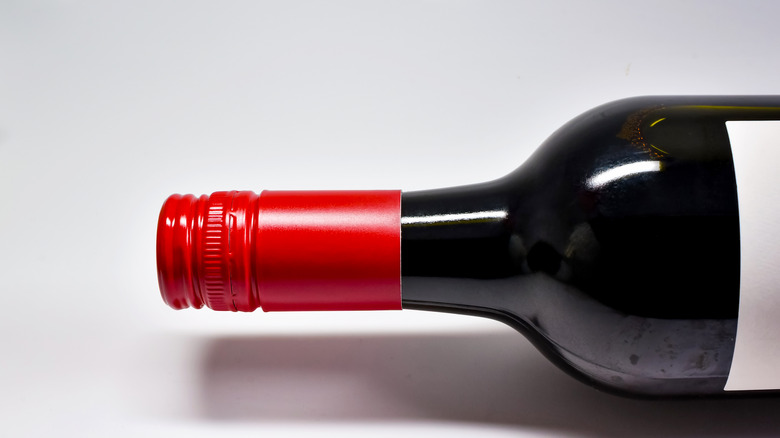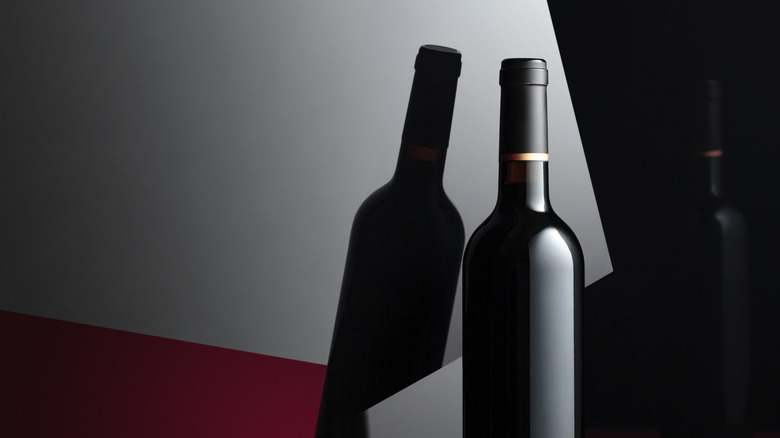The Best Kind Of Screw Top Wine That Won't Sacrifice Flavor
Wine is a complex subject. Whether you're choosing the right kind to pair with fruit or you're trying to figure out what kind to order off the menu, you find yourself racking your brain over something that's basically fermented grapes. So complex is the world of wine and how it appeals to the many different tastes of consumers and sommeliers that there's even some debate on how the wine should be sealed in its bottle.
The most common way to seal a bottle of wine would obviously be the cork, and that's not jus an aesthetic choice. Some sources state that certain types of cork can actually impact the taste of your wine. According to Wine Folly, a high-quality cork can keep large amounts of oxygen from getting into your wine and causing oxidation, while a poor, low-quality cork would not only allow oxygen to enter and wine to escape but also taint your wine with the chemical trichloroanisole. As VinePair explains, a good cork not only keeps your wine bottle watertight — it also introduces small amounts of oxygen into the wine to help it "mature." A good cork helps get the most out of your wine.
But if corks are the premier option, then what about screw top bottles? Would it stand that, since these bottles lack a cork, these wines would lack flavor and body, or can screw top bottles stand up to even the most expensive of corked wines on the market?
Screw top wines can be good if chosen correctly
If you're unsure what a screw top is, MasterClass describes it as being an aluminum cap that is "screwed on" to the bottle by way of etched grooves in the bottleneck. In basic terms, think of the screw top as being like the "bottle cap" for your wine, as compared to corking it shut. If the cork is praised for its properties in helping to protect and embody the wine, what makes screw top wines so good?
According to PureWow, a common mistake one may make when buying wine is that they skip over the screw top wines for the older cork bottles. This is because some believe that the screw top signifies a cheap bottle of wine, while a cork represents a pricier, but better wine. Although PureWow admits this may have been true some time ago, the trick is to find bottles of wine, either red or white, that are meant to be opened early rather than aged on a shelf. These types of wines will usually have a screw top, since they don't need to be sealed and aged for long periods of time.
What else separates a screw top from a cork?
Okay, you're probably wondering, if a screw top is basically a "bottle cap" for my bottle of wine, why should I be so concerned about choosing it over a bottle with a cork? While you may find this debate to be a trivial one, many wine experts argue that there are greater differences between a screw top and a cork than just how it keeps your bottle of Pinot from spilling on your carpet.
As WineCountry explains, while a cork's porous surface allows air to enter in controlled amounts, a screw-top ensures no oxygen can get it. Recall that small amounts of oxygen over time can help change the flavor of the wine, and something that keeps oxygen out completely wouldn't be good for a wine you want to age. This is why screw tops are found on bottles of wine that are meant to be opened early.
Duplin Winery also gives many reasons why a screw top is preferable to a cork. Not only are screw tops easier to put on than a cork and more environmentally sustainable, but it guarantees fresh wine. Unlike corks, which may be cheap and low-quality and could rot over time, a screw top ensures that the wine remains fresher for longer.
Of course, whether you like screw top wines or corked wines, you should always keep in mind some useful tips to ensure that whatever wine you get pairs well with your meal.


